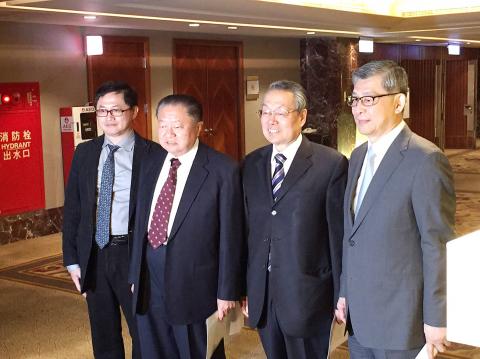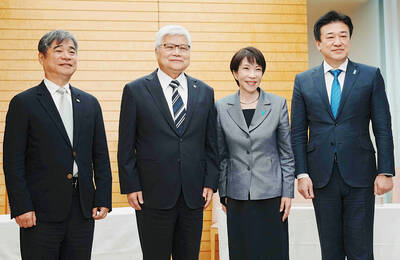Some of the nation’s leading entrepreneurs yesterday called on the government to revise insider trading regulations to facilitate the growing number of mergers and acquisitions in Taiwan.
Their call came after venture capital mogul Ko Wen-chang (柯文昌) was sentenced to nine years in prison for violating insider trading laws.
The ruling is final, after the Supreme Court on Friday last week upheld a Taiwan High Court ruling against Ko, chairman of private equity fund WK Technology Fund (普訊創業投資).

Photo: CNA
Ko in 2006 ordered his employees to buy shares in Taiwan Green Point Enterprise Co Ltd (綠點科技), after Green Point signed a non-binding letter of intent with US company Jabil Circuit Inc.
The Taiwan High Court said in its ruling that Ko and two other defendants knew Jabil Circuit would purchase Green Point and exploited the information to purchase Green Point’s stake over the course of several trading sessions, which violated Taiwan’s insider trading regulations.
Ko made NT$400 million (US$12 million at current exchange rates) in profit from trading Green Point shares, according to the ruling.
Acer Inc (宏碁) founder Stan Shih (施振榮), Delta Electronics Inc (台達電) founder Bruce Cheng (鄭崇華), Cathay Financial Holding Corp (國泰金控) chairman Tsai Hong-tu (蔡宏圖) and Pegatron Corp (和碩) chairman Tung Tsu-hsien (童子賢) urged judicial authorities to clarify the definition of insider trading.
“It is a mistake for the court considered purchasing a company’s shares after the firm inked a non-binding letter of intent as insider trading, as having a letter of intent does not guarantee an investment would actually take place,” Shih told a news conference.
“A non-binding letter of intent does not necessarily result in an investment. It is different from conducting due diligence prior to signing a business contract,” Shih said.
Due diligence is an investigation of a business prior to the signing of a contract — an important process undertaken before officially merging or acquiring a company, he added.
Shih said that, as mergers and acquisitions have become increasingly common, the court’s ruling in Ko’s case would hinder dealmaking.
Citing Powerchip Semiconductor Corp (力晶半導體) chairman Frank Huang’s (黃崇仁) case, Tsai said the Supreme Court in January upheld the High Court’s not guilty ruling because it deemed insider trading to be the selling or purchasing of shares on the stock market after due diligence is completed.
Tsai said the court should be consistent in defining insider trading, otherwise businesses would not know how to remain compliant when undertaking mergers or acquisitions.
Financial Supervisory Commission Chairman William Tseng (曾銘宗) said that the laws governing insider trading have long been established, adding that it has never been a cause of widespread concern among businesses.
In Ko’s case, the two companies had signed a non-binding letter of intent, but did not complete due diligence nor did they assess the price of the acquisition, Tseng said.
Business leaders should be well aware of the law, he added.
Additional reporting by Ted Chen

Right-wing political scientist Laura Fernandez on Sunday won Costa Rica’s presidential election by a landslide, after promising to crack down on rising violence linked to the cocaine trade. Fernandez’s nearest rival, economist Alvaro Ramos, conceded defeat as results showed the ruling party far exceeding the threshold of 40 percent needed to avoid a runoff. With 94 percent of polling stations counted, the political heir of outgoing Costa Rican President Rodrigo Chaves had captured 48.3 percent of the vote compared with Ramos’ 33.4 percent, the Supreme Electoral Tribunal said. As soon as the first results were announced, members of Fernandez’s Sovereign People’s Party

EMERGING FIELDS: The Chinese president said that the two countries would explore cooperation in green technology, the digital economy and artificial intelligence Chinese President Xi Jinping (習近平) yesterday called for an “equal and orderly multipolar world” in the face of “unilateral bullying,” in an apparent jab at the US. Xi was speaking during talks in Beijing with Uruguayan President Yamandu Orsi, the first South American leader to visit China since US special forces captured then-Venezuelan president Nicolas Maduro last month — an operation that Beijing condemned as a violation of sovereignty. Orsi follows a slew of leaders to have visited China seeking to boost ties with the world’s second-largest economy to hedge against US President Donald Trump’s increasingly unpredictable administration. “The international situation is fraught

Taiwan Semiconductor Manufacturing Co (TSMC, 台積電) plans to make advanced 3-nanometer chips in Japan, stepping up its semiconductor manufacturing roadmap in the country in a triumph for Japanese Prime Minister Sanae Takaichi’s technology ambitions. TSMC is to adopt cutting-edge technology for its second wafer fab in Kumamoto, company chairman C.C. Wei (魏哲家) said yesterday. That is an upgrade from an original blueprint to produce 7-nanometer chips by late next year, people familiar with the matter said. TSMC began mass production at its first plant in Japan’s Kumamoto in late 2024. Its second fab, which is still under construction, was originally focused on

GROWING AMBITIONS: The scale and tempo of the operations show that the Strait has become the core theater for China to expand its security interests, the report said Chinese military aircraft incursions around Taiwan have surged nearly 15-fold over the past five years, according to a report released yesterday by the Democratic Progressive Party’s (DPP) Department of China Affairs. Sorties in the Taiwan Strait were previously irregular, totaling 380 in 2020, but have since evolved into routine operations, the report showed. “This demonstrates that the Taiwan Strait has become both the starting point and testing ground for Beijing’s expansionist ambitions,” it said. Driven by military expansionism, China is systematically pursuing actions aimed at altering the regional “status quo,” the department said, adding that Taiwan represents the most critical link in China’s